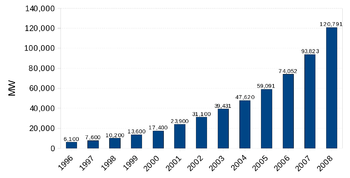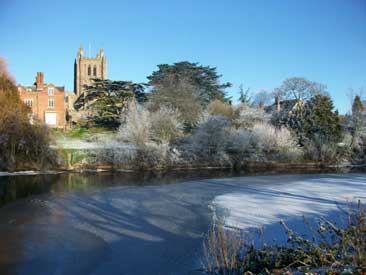 (World Wind Power growth)
(World Wind Power growth)
The goal of radically reducing Co2 emissions and ensuring energy security by converting to 100% renewable sources of energy for the full range of energy use; electricity, heat and transport is looking more achievable as time goes by. A small but growing number of local communities have already achieved this goal. Usually they are relatively small towns and villages with good local renewable energy resources. Converting big cities and whole countries to renewables is a more challenging prospect. However for a growing number of countries this is becoming a very real possibility.
“Scotland could phase out all fossil fuel and nuclear power by 2030, maintain a secure electricity supply and generate significant revenue from renewable exports, according to new research by one of the world’s leading energy consultants, Garrad Hassan”, quoted from Friends of Earth Scotland (http://www.foe-scotland.org.uk/power-secured ). And this includes the electrification of heating and transport. Scotland has the windiest climate in Europe, so on average each turbine will produce about 50% more than the same turbine in Germany, giving the Scottish wind industry a huge economic advantage.
Wind is famously fickle. It stops and starts, and it varies in strength: intermittence and variability in the language of the power industry. These problems can be overcome with either energy storage or power grids covering a sufficiently large area to even out the fluctuations in the wind. The eventual solution will be an evolving mixture of both grids and storage.
20th January 2011 was a very good day for the UK wind industry in general and the Scottish wind industry in particular. David Cameron announced his support for a Supergrid linking wind farms from the Irish Sea through the North Sea to the Baltic Sea. ( http://www.businessgreen.com/bg/news/1938599/david-cameron-steps-support-north-sea-supergrid ) Once built, this will have a dramatic effect on levelling out the fluctuations in wind power. On the same day the German engineering giant Siemens announced their plans to build a large wind turbine factory in Hull, and the Spanish turbine manufacturer Gamesa announced plans to build a factory in Glasgow and are considering another in Dundee. Wind is rapidly becoming a very major power source, as shown in the above graph.
Monthly Archives: January 2011
Environmental Study Day
Workers Education Association – Environmental Study Day:
Speaker – Richard Priestley
Saturday 19th March – 10:00 to 16:00 at The Market Theatre, Ledbury (http://www.themarkettheatre.com/)
A course designed for people interested in the global situation, which will hopefully enable you to see paths to a better future. The focus will be global and local, and cover many fields: energy, transport, agriculture and governance. In the afternoon there will be a screening of the film In Transition: from Oil Dependence to Local Resilience directed by Emma Goude, followed by discussion about the Transition movement and wider issues. Suitable for adults and 16+. Tickets £15: phone 01531-633345 or 01584-540624
Climate Chaos

For much of December 2010 the River Wye, just near my house, was frozen over with ice extending bank to bank, as happened in January 2010. On 8th January 2010 I wrote my first blog about the freezing River Wye, the difference between weather and climate, and the need to tackle Climate Change. Again we have people feeling the cold and being ever more sceptical of Climate Science. Climate Change as an issue has slipped down the public, political and media agenda.
Yet as the emerging statistics reveal, 2010 has been a record hot year, with the Northern Hemisphere experiencing the hottest year on record, the Southern Hemisphere the sixth warmest, and the Global average being the equal hottest year on record, jointly with 2005 ( http://www.ncdc.noaa.gov/sotc/global/ )
Whether there is a correlation between our local cold winter and a general warming of the planet is unclear and contentious. Some Climate scientists, notably Petoukhov and Semenov ( http://www.agu.org/pubs/crossref/2010/2009JD013568.shtml ), speculate that our cold winters may be in part caused by the reduced ice cover on the Barents-Kara section of the Arctic Ocean. There is no clear pattern: the UK has had some very cold and some very warm winters of late. What is clear is that we should not look just at our local weather and think we can learn much about Climate Change.
Globally the picture is clear. Overall global temperatures do appear to be generally following an upward trend, and extreme weather events do seem to be becoming more frequent and more severe, exactly as all the Climate models suggest. We must understand that Climate Change is non-linear: sporadic, sudden and apparently contradictory weather patterns are all part of the chaos that is Climate Change.
This is an issue which should not be ignored. There is so much that could and should be done to tackle Climate Change while simultaneously promoting many aspects of greater ecological sustainability and social justice, as I will seek to show in all the blogs over the coming year.
